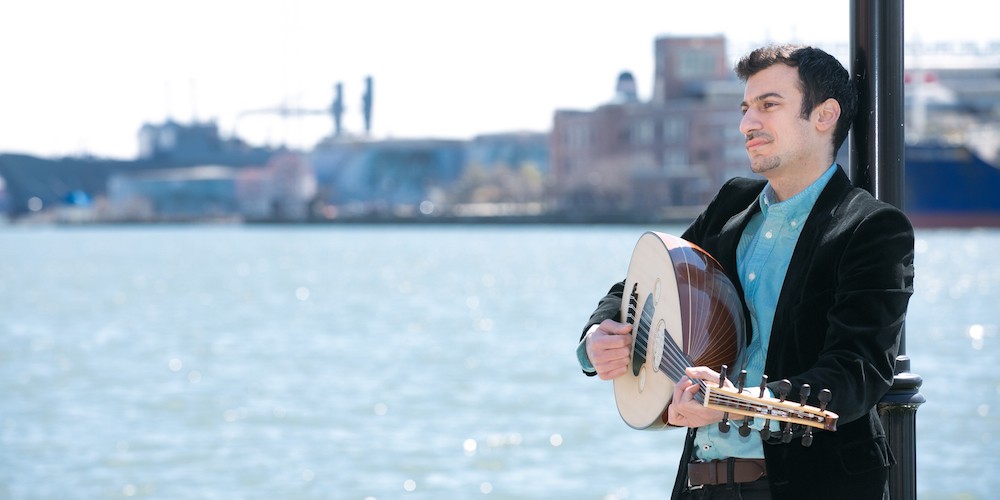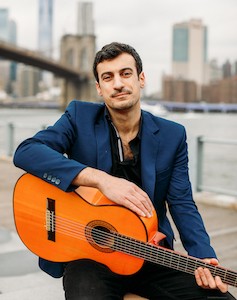Writers in Collaboration: Traveling the Critical Distance to Where Legacy Lives
Writers in Collaboration is a series covering writers involved in two art mediums and/or working with other artists.
This week we sat down with current nonfiction student Raffi Joe Wartanian, a writer, composer, singer-songwriter, musician, and social activist, to talk about, among other things, his latest album, Critical Distance. The new album is an aesthetic shift which parallels his current nonfiction work. “I wanted it to be very raw and...without ornamentation—just the music from the instrument in as natural a way as possible.”
One day during his long 4-year confinement at a refugee camp in Syria, Mardiros Baloumian walked out into the city and by chance found himself wandering in on a presentation on hypnosis. After fleeing the genocide in his native Armenia, seeing his family disperse, this introduction to an art of the inner world may have offered a kind of permanence that the outer world could no longer give him.
Baloumian would go on to write five books on his experience of surviving the Armenian genocide as well as esoteric and philosophical treatises on the world that his great grandson, Raffi Wartanian, nonfiction writing student, would eventually translate and incorporate into his own book about the family. Both men would try to summon that ravaged land, Armenia, which won its independence in 1918, only to lose it two years later to the Soviets; it would have to wait until 1991 to win back its independence.
Before the genocide, the family lived on indigenous Armenian land in what is now called eastern Turkey. After Syria, Wartanian’s family migrated to Beirut, Lebanon, but were forced to flee again when Civil War broke out. Eventually they relocated to Baltimore, where Wartanian was born. The extended klan dispersed; some members went to Cypress, France, Canada, the US, and Uruguay.
Wartanian grew up speaking Armenian at home, and he went to Lebanon almost every summer to visit his grandparents and cousins. “Occasionally people would tell their stories about the genocide or the Civil War so we were well aware of all the things that had happened. It was actually sort of commonplace, and it was just part of the story of our family.”
Currently an instructor in the Undergraduate Writing Program as well as completing his thesis, Wartanian is also a musician about to release his second album. Tentatively called Critical Distance, which he jokingly says is a term he picked up in the writing program, his new work represents an aesthetic shift in his musical evolution and is, it seems, an attempt to forge deeper connections to his Armenian heritage, his family, and to himself.
“The album’s title has several layers of meaning: It represents the distances my family traveled through, as well as all of these cultural idioms that have come into my aesthetic palette through music and writing. The second reason is that the music was created through transformational moments in life. Having a critical distance from those moments so that I can reflect on them through music and through writing.”
Musically, Critical Distance explores the space between two pillars of Wartanian’s identity: Anatolia and the Middle East, as well as the music of Baltimore where he grew up, a combination of Appalachian Bluegrass, soul, funk, and the blues. “So there is a lot of conversation of styles happening.” A selection on his new album is called “Appalachitolia”. He also included a blues song on the oud, a pear-shaped stringed instrument much like a lute, usually associated with Middle Eastern music. He picked up the oud in Armenia, where he performed original music sometimes for school children in remote, mountainous villages.
He has performed internationally as an oud player, alongside, among others, Grammy Award-winning flutist Mary Youngblood, and has written music and lyrics for vocalist Eileen Khatchadourian. Recently he performed with a jazz ensemble in Brooklyn.
The eight compositions comprising his new album are very much inspired by flamenco and classical technique and represent a totally different direction for Wartanian. Instrumental compositions are performed solo or with just a standup bass and a percussionist. This austerity allows the instruments to speak. “Rather than me singing and having electric instruments with all sorts of effects, I wanted it to be very raw and without ornamentation—just the music from the instrument in as natural a way as possible.”
While his first album, Pushkin Street, released in 2013, was named for the block where he performed in Armenia, the singer-songwriter’s compilation basically reflects his American influences. It is, as he characterizes it, “sort of inspired by Frank Zappa, Dick Dale, and the Beatles.” It is steeped in the American vernacular.
His transition to “a less ornamental style” in his second album parallelled a shift toward writing nonfiction, specifically family narratives, that required a different, more vulnerable, and straightforward approach. He felt he could not hide behind the “aesthetic, stylistic tactics of poetry and fiction.”
So, too, in the music. “I’m not surrounded by a band, not plugged into an amp where I can manipulate certain effects, so my technique has to be sharp and I really have to be confident about what I’m doing and very clear. When I go up there to perform there is nothing to hide behind.”
The event that influenced this aesthetic shift seems to be the work Wartanian did at a refugee resettlement center in southeastern Baltimore for roughly two years. At this center, he interacted with refugees from Eritrea, Bhutan, Democratic Republic of Congo, Burma and Iraq. “The refugee center made me more aware of, and better appreciate, what my family had gone through, because every day I was working with people who went through the exact same things; it made me think more carefully and reflect, and really want to know what happened. This meant trying to understand my great grandfather’s books and feel motivated to take up that task and to push to know what really happened.”
He worked with translators and interviewed his grandmother and her siblings, his parents, and his own siblings, collected letters and photos and has done research trips to Lebanon, Turkey and Armenia. “I like to think that the story comes first and then we have to think of the right form to bring the best out of the story. Some stories you can’t tell with words so one might create a painting or musical composition, or if the story needs to be in dialogue.”
It is his love of storytelling that led Wartanian to the writing program to begin with. Before he enrolled in the School of the Arts, he completed a Master of International Affairs from the SIPA program. But even there, he says “I was like a fish out of water ...I was more interested in telling a story.”
Last year, he combined his work on the international level with his love of writing in Letters for Peace, a program Wartanian launched with the aid of grants from the Eurasia Partnership Foundation and the Davis Projects for Peace. The program held writing workshops that brought together high school and undergraduate students in order to encourage dialogue across the troubled border between Armenia and Azerbaijan. Students wrote letters, translated them and then exchanged them, in an effort to articulate peace through the transformative power of art.
He is still working out the narrative structure of his book now, the story of his generation with pivots to family history, perhaps alternating chapters of the present, 2001 to 2019, with the family’s past from 1895 on.
But it is clear that in his music and in his writing, Wartanian is traveling towards Mardiros Baloumian, his great-grandfather who many years ago walked out of a refugee camp and into a discipline that hoped to harness the power of consciousness, a man Wartanian never met but whose books shaped his life. The more Wartanian writes the more likely it will be that they meet somewhere on that mythical landscape where writing and life converge, where with a trick of the light, the present bends to the past.

